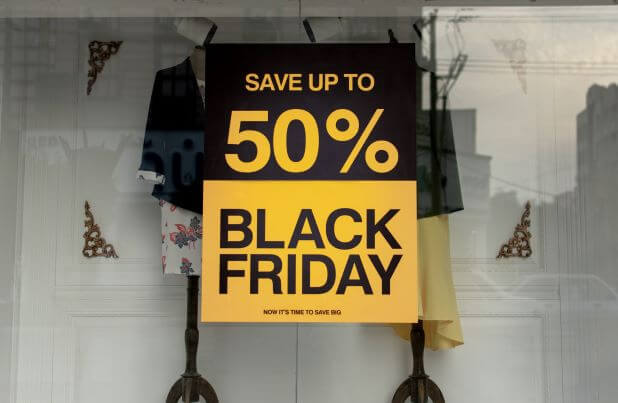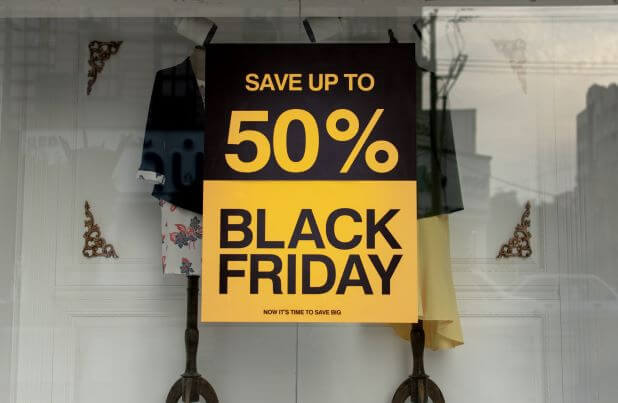Black Friday deals are just around the corner, but online shoppers should watch out for Black Friday scams. This year, it is anticipated that the majority of holiday shopping will be done online due to the pandemic, according to News19. During COVID-19, retail sales have been in decline while e-commerce has increased, according to the U.S. Department of Commerce as referenced by CNBC. This may come as no surprise as many consumers have switched to online shopping while sheltering in place.
Black Friday deals versus Black Friday scams
With Black Friday approaching this week, it will likely be a busy online shopping week and weekend for many Americans hoping to find the best deals. However, Black Friday provides the perfect opportunity for scammers who count on shoppers overlooking red flags while searching for a bargain. Online shoppers should be wary when a deal looks too good to be true. Stay safe and avoid Black Friday scams by following these tips:
Avoiding Black Friday Scams Tip #1: Watch out for phishing scams
Business Insider warns shoppers to carefully “Examine all delivery-related emails and texts closely — some of them may not be legitimate.” With the surge in online shopping comes an increase in package deliveries. Nowadays, it is expected that a text message or email alert accompanies your anticipated deliveries. This presents the opportunity for phishing scams. In this type of scam, you might receive a message that looks like it is from a legitimate sender (like Amazon or FedEx). Be sure to examine delivery messages before clicking on any accompanying link or entering sensitive information. These types of scams could involve an attempt to steal your data or infect your device with malware. Red flags include typos, grammatical errors, or unknown senders.
Avoiding Black Friday Scams Tip #2: Be wary of digital card-skimming
Card skimming occurs when your personal information is stolen when you use a card at a compromised payment point. Digital card skimming is the online version of this. This year, CNET warns shoppers to look out for digital card-skimming, citing an incident with Macy’s last year as a prime example. CNET reports that a code was added to the website on Macy’s payment portal, which captured private information from customers, such as payment card details, including expiration dates/security codes, names, addresses, and phone numbers. Unfortunately, this type of scam doesn’t leave many clues to be easily detected. To protect yourself, try to use a trusted third-party payment app and don’t save your card details on shopping sites. Furthermore, put a purchase alert on your cards so that you can monitor any suspicious purchases and report them.
Avoiding Black Friday Scams Tip #3: Use unique passwords on each site you shop on
With all the many, many webshops you visit this year, it might be tempting to create one or two passwords that you recycle over and over as you create accounts. This strategy leaves you vulnerable. The easiest way to get around this is by shopping as a guest and not making an account at all. But for many consumers, the convenience of having your payment and shipping details saved may seem like a more attractive choice. If you choose to make an account, create a strong and unique password. Why? If you recycle your passwords, and a hacker compromises one of the many sites you’ve logged into during your shopping spree, then they could log into another account on a different site. It’s like giving the hacker a master key to a bunch of different doors, all storing your personal information.
Avoiding Black Friday Scams Tip #4: Don’t fall for the hype; do a little research and read up on the reviews
In their article called “How to Shop Safely Online on Black Friday,” PCMag reminds shoppers that “If it seems too good to be true…”, it might be. There are several ways to verify the authenticity of a Black Friday deal. For one, you can check out the reviews. Have people actually bought this product? You should expect to see a mix of positive and negative reactions. Second, is the product being sold by a trusted retailer? PCMag suggests checking the Better Business Bureau. It might sound simple or obvious, but you could always Google the deal + scam to see if there is any buzz or speculation about it (For example, a search could be something like: “80% off deal on iPhone 12 scam”). A little bit of research could save you a lot of money if you avoid being duped by some Black Friday scams.
The shift from retail to online shopping began during the beginning of the pandemic. To stay safe and avoid Black Friday scams, it is necessary to take a few precautions. Watch out for phishing scams that count on consumers overlooking red flags. Be wary of digital card-skimming; set purchase alerts on your credit cards to monitor suspicious activity. Use unique passwords for accounts that you make with online retailers. Don’t fall for the hype; if it looks good to be true, have a healthy amount of suspicion. With these tips, hopefully, online shoppers can stay safe and enjoy some #BlackFriday deals!










